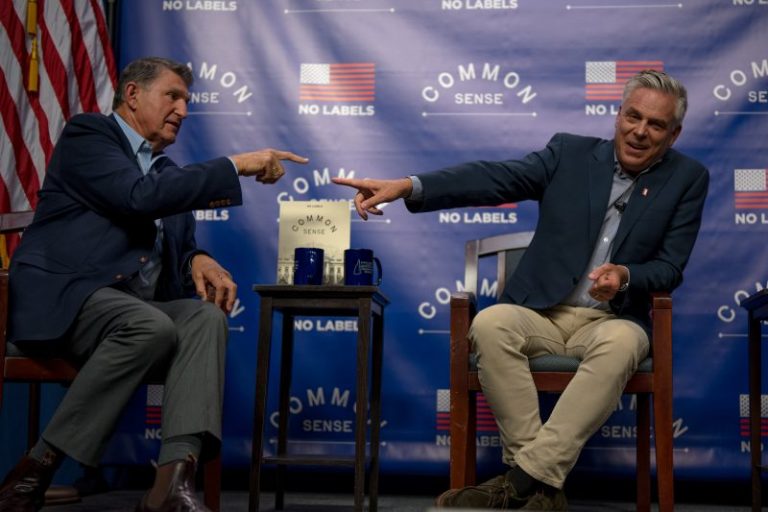The fast-emerging conventional wisdom is that a bipartisan No Labels ticket in the 2024 presidential race would benefit Donald Trump by pulling more votes away from President Biden. Hence the increasingly urgent Democratic pushback on No Labels’s plans.
But a new poll calls that conventional wisdom somewhat into question.
Thus far, those of us who have tried to gauge the potential impact of such a ticket have not had much to work with. No Labels’s own polling from December suggested that Trump gains when a “moderate independent candidate” is included, moving from a one-point lead to a five-point lead — a four-point gain. A poll last month commissioned by No Labels’s critics showed much the same: The presence of a generic independent candidate moved Trump from down four points to leading by one — a five-point gain for Trump.
But as we’ve noted, much could depend on who the candidates actually are and the atmosphere next year.
But Monmouth University pollsters have dug a little deeper. And the data suggests it might not be as simple as the conventional wisdom suggests.
The poll tested three races: one with just Trump and Biden; one that also included a generic “fusion” ticket; and one with two specific candidates on that fusion ticket — Sen. Joe Manchin III (D-W.Va.) and former Utah governor Jon Huntsman Jr. (R). (Those two men attracted attention as a potential ticket this week by leading No Labels events in New Hampshire.)
Initially, Biden leads Trump by seven points (47-40) in the head-to-head among those who will “definitely” or “probably” vote for either one. But unlike the other polls, Monmouth’s shows no significant shift when a third-party ticket is introduced. With a generic “fusion” ticket, Biden’s edge actually goes to nine points. With Manchin and Huntsman specifically, Biden has a six-point edge.
Also notable: More Republicans (25 percent) than Democrats (18 percent) say they would at least “probably” vote for a generic fusion ticket. And more also say they would “probably” vote for a Manchin-Hunstman ticket — 15 percent of Republicans to 8 percent of Democrats.
It bears emphasizing that, in all likelihood, these numbers of people wouldn’t wind up actually voting for such tickets; third-party tickets almost always poll better than they ultimately perform, because voters ultimately want to choose between candidates who have a chance of winning.
But there, too, the Monmouth numbers are interesting.
The pollster tried to simulate such a situation — one in which it was looking like that ticket could indeed become a spoiler in the race.
When it floated the idea that such a third-party ticket might actually help Biden, the numbers of Republicans and Democrats who still say they would vote third-party is nearly equal; 14 percent of Republicans say they would, and 13 percent of Democrats say they would.
But when it floated the idea that such a ticket could play a spoiler and help Trump — the specific scenario about which Democrats are warning — Democrats are significantly less likely to vote third-party (7 percent) than are Republicans (19 percent). In that scenario, Biden’s initial seven-point edge effectively grows to 10 points, 43-33.
This is just one poll, but it suggests a few things.
One is that, were Democrats to make a strong case that a No Labels ticket was going to help Trump (as they’ve set about doing), it could insulate their side from its effects. It’s not a given that that message would register with casual voters, but it does seem there is a scenario in which there could be as many or more disillusioned Republicans who would be willing to go the third-party route. That’s particularly if Trump, the great mobilizer of the Democratic base, is the alternative, and perhaps if Trump’s legal problems prove to be more of an albatross than they are right now.
Another thing the poll suggests is that perceptions of the ticket itself could matter. People might generally like the idea of an independent candidate — they long have, in theory at least — but not necessarily a fusion ticket with a Republican and a Democrat.
Further, the specific Republican and Democrat would matter. As we’ve noted, Manchin is a Democrat, but he’s actually significantly more well-liked among Republicans. Pair him with a standard-issue, traditional Republican who has broken with Trump (such as Huntsman), and the ticket actually would seem more ideologically aligned with conservatives.
(We’ve wagered that No Labels might feel pressure to put a Republican at the top of the ticket because of the pushback it has received from Democrats. The Monmouth poll, notably, tested Manchin-Huntsman tickets with each man as the actual nominee, finding similar results in both situations.)
None of which means the fears about what a No Labels ticket could mean for Biden are unwarranted. William A. Galston, writing in the Wall Street Journal, and Al From and Craig Fuller, writing in The Washington Post, lay out convincing cases that the group would help Trump. No Labels has insisted it will field a ticket only if it is viable and will not benefit Trump. Critics have expressed suspicion about its motives, particularly given that the group will not reveal its donors — one of whom is reportedly the conservative megadonor Harlan Crow.
But the data on which we’ve based those assumptions to date has been limited. Thankfully, we’re now getting more to fill out the picture, and we should have plenty by the time No Labels makes its decision in April.

